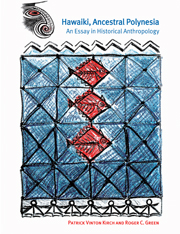Book contents
- Frontmatter
- Contents
- List of figures
- List of tables
- Preface
- List of language abbreviations
- Prologue: on historical anthropology
- Part I The phylogenetic model: theory and method
- Part II Rediscovering Hawaiki
- Epilogue: on history, phylogeny, and evolution
- Notes
- Glossary of terms
- References
- Subject Index
- Index of Proto Polynesian Reconstructions
Epilogue: on history, phylogeny, and evolution
Published online by Cambridge University Press: 06 January 2010
- Frontmatter
- Contents
- List of figures
- List of tables
- Preface
- List of language abbreviations
- Prologue: on historical anthropology
- Part I The phylogenetic model: theory and method
- Part II Rediscovering Hawaiki
- Epilogue: on history, phylogeny, and evolution
- Notes
- Glossary of terms
- References
- Subject Index
- Index of Proto Polynesian Reconstructions
Summary
In place of the events that are dust, Braudel urged us to focus our attention on two … kinds of time he considered more real. There are the enduring structures … that determine over the longue durée … our social ecology, our civilizational patterns, our modes of production. And there are the cyclical rhythms of … these structures – the expansions and contractions of the economy, the alternation of emphasis in political and cultural phenomena… Underneath the ephemeral happenings of the immediate public arenas lie the enduring continuities of patterns … that change slowly.
wallerstein 1991:137–38Anthropology and history are inseparably linked. We do not refer just to the scholarship derived from written documents, but to the primacy of chronological perspective, whatever “texts” must be consulted. In the narrow, documentary sense, there is a growing history of anthropology, which productively decodes the discipline's own archives. But increasingly one finds robust endeavors in anthropological history (incorporating traditional “ethnohistory”), and in historical archaeology (which consciously integrates the study of documents and material culture). In some parts of the world, ancient texts even extend such enterprises well back into antiquity. For the Maya of prehistory, the recent ability of scholars to read the Classic Period glyphs has opened the door to a political history of named actors, places, and dates.
As we observed in our Prologue, some scholars would extend historical anthropology to encompass an entire range of evidence well beyond written texts, and have labeled such an approach “holistic archaeology.”
- Type
- Chapter
- Information
- Hawaiki, Ancestral PolynesiaAn Essay in Historical Anthropology, pp. 277 - 284Publisher: Cambridge University PressPrint publication year: 2001



